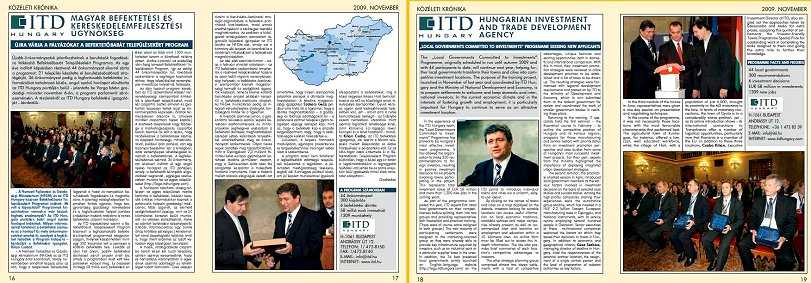

HUNGARIAN INVESTMENT AND TRADE DEVELOPMENT AGENCY
"Local Governments Committed to Investments" Programme seeking new applicants
The "Local Governments Committed to Investments" Programme, originally scheduled to run until autumn 2009 and with 44 participants to date, will continue next year, helping further local governments transform their towns and cities into competitive investment locations. The purpose of the training project, launched in November of last year and coordinated by ITD Hungary and the Ministry of National Development and Economy, is to prepare settlements to welcome and keep domestic and international investors. In the current economic climate and in the interests of fostering growth and employment, it is particularly important for Hungary to continue to serve as an attractive investment location.
In the experience of the ITD Hungary team, the "Local Governments Committed to Investments" Programme has proved to be Hungary's most effective investment programme. It has allowed the organisation to make 300 recommendations to foreign investors, resulting in positive investment decisions for six projects involving towns participating in the project. This represents total investment value of EUR 58 million and more than 1,300 new jobs in the coming years.
As part of the programme completed this year, ITD experts first rated local governments on their competitiveness before splitting them into two groups and providing representatives with theoretical and practical training. (There were of course some assigned to both groups.) The vast majority of participating settlements were assigned to the marketing-oriented group as they were already able to provide key infrastructure required by investors, such as an industrial park or a particular supplier base in the area. In addition, the 36 best prepared local governments jointly launched an English-language website (http://logo.itdhungary.com) on the ITD portal to introduce individual towns and cities via a uniform, easy-to-use layout.
By clicking on the names of towns and cities on a map displayed on the website, investors looking for suitable locations can access useful information on local economic traditions, available services and major companies already present, as well as recommended sites and statistics on employment and education within a 50 kilometre area. An online form must be filled out to access this in-depth information. The site also provides brief summaries of each location's competitive advantages to investors.
The other strategic planning group comprised almost two dozen settlements with a host of competitive advantages, unique features and exciting opportunities, both in domestic and international comparison. With this in mind, their investment promotion strategies were reviewed to allow development priorities to be established and a list of tasks to be drawn up. The resulting strategies were harmonised with regional development requirements and passed on by ITD to the Ministry of Development and Economy, which in turn submitted them to the federal government for review and coordinated the work of smaller government bodies in realising these plans.
Returning to the training, IT specialists held the first seminar - the theoretical course in February - to outline the competitive position of Hungary and its various regions, prospects for those manufacturing and service sectors with priority status from an investment promotion perspective and case studies from some of Hungary's most successful investment projects. For their part, experts from the ministry highlighted the importance of deploying integrated urban development strategies.
The second seminar, the practically oriented session in April, introduced local government members to the various factors involved in investment decisions on the basis of selected case studies and success stories. Among the high-profile companies sharing their experiences were the automotive group Modine, which has invested in a HUF 2.3 billion Eastern European manufacturing base in Gyöngyös, and National Instruments, with its service centre employing several hundred people in Debrecen. Senior executives of these multinational companies explained the factors on which they based their decisions to invest in Hungary. In addition to economic and geographical criteria, Géza Szakács, managing director of Modine in Hungary, cited the responsiveness of the potential partner location, the assignment of a single contact person and the level of preparation of relevant authorities as key factors.
In the third module of the course in June, representatives were given a one-day session on presentation and negotiating techniques.
In the course of the programme, it was not necessarily those locations with the most favourable characteristics that performed best. The agricultural town of Kunhegyes, for instance, offered a low-cost, well educated workforce, while the village of Hort, with a population of just 4,000, brought its proximity to the M3 motorway to the fore. In terms of motorway connections, the town of Gyula is in a considerably worse position, yet - as its online introduction shows - its international connections to Transylvania offer a number of logistical opportunities, particularly now that Romania is a member of the EU. In addition to these three locations, Csaba Kilián, Executive Investment Director at ITD, also singled out the approaches taken by Békéscsaba and Makó for extra praise, assigning this quintet of settlements the Investor-friendly Towns Programme Special Prize for outstanding work in completing the tasks assigned to them and going the extra mile to further their knowledge.
Programme facts and figures
44 local governments
300 recommendations
6 investment decisions
EUR 58 million in investments
1309 new jobs
H-1061 BUDAPEST, ANDRÁSSY ÚT 12.
TELEPHONE: +36 1 473 82 39
E-MAIL: info@itd.hu
INTERNET: www.itdhungary.com